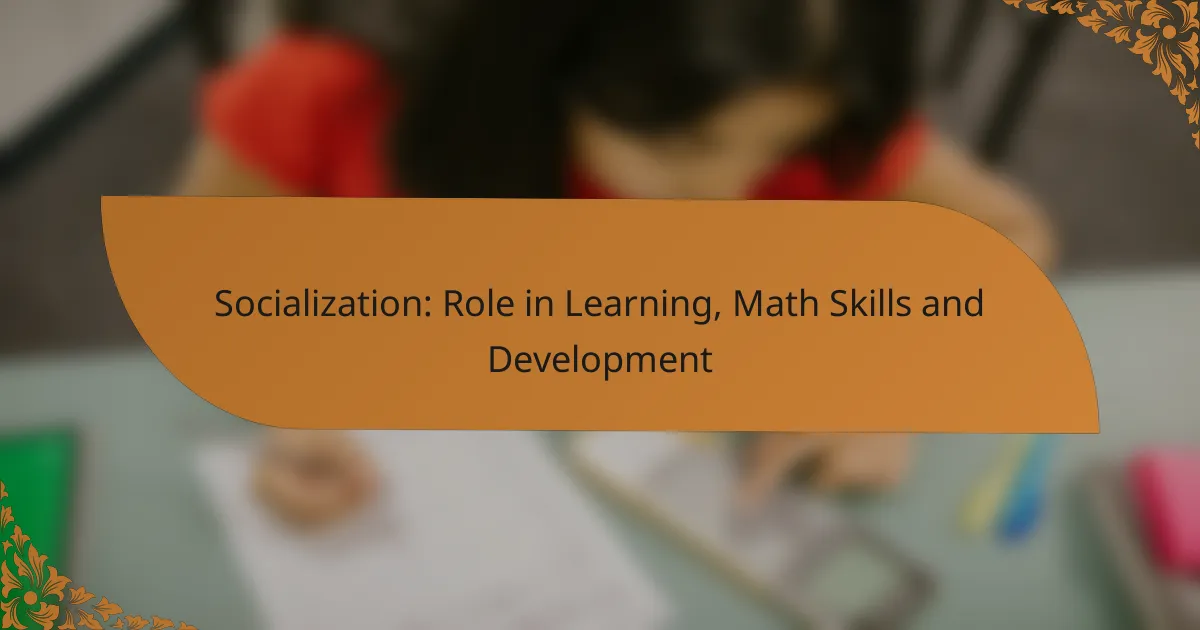Socialization plays a crucial role in children’s learning by enhancing their ability to interact and collaborate with peers. This interaction not only fosters essential communication skills but also significantly contributes to the development of math skills, as children share diverse problem-solving strategies. By engaging in social activities, parents can further facilitate these interactions, promoting teamwork and cognitive growth that are vital for academic success.
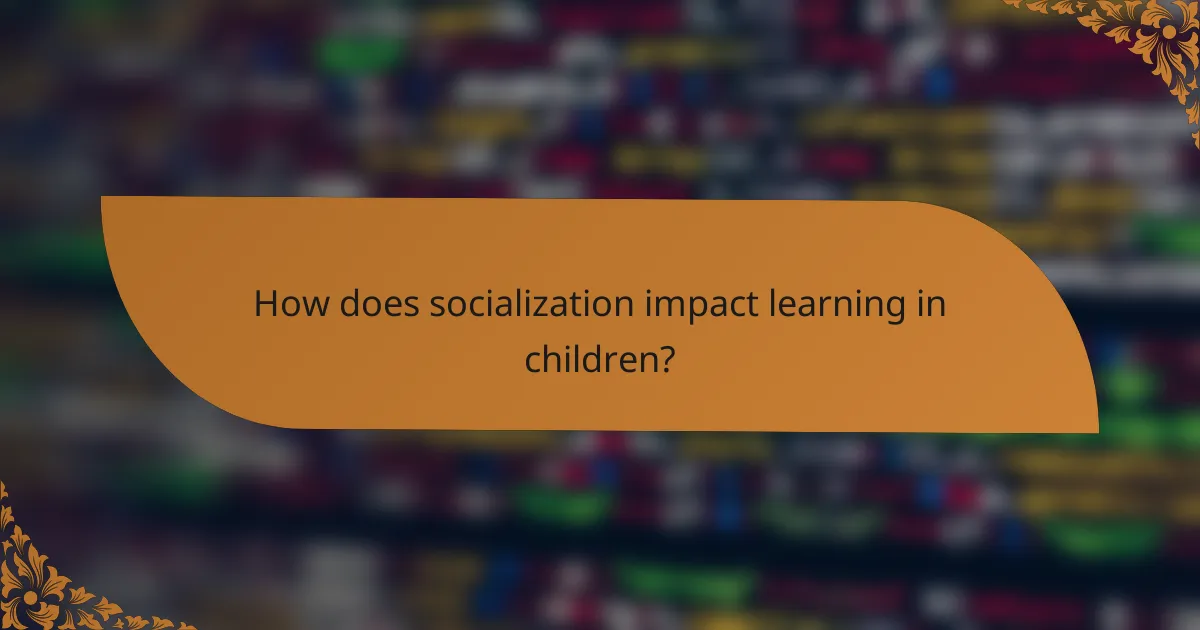
How does socialization impact learning in children?
Socialization significantly influences learning in children by shaping their ability to interact, communicate, and collaborate with others. Through social experiences, children develop essential skills that enhance their cognitive abilities and overall development.
Enhances communication skills
Socialization helps children refine their communication skills by providing opportunities to practice speaking, listening, and understanding non-verbal cues. Engaging with peers and adults in various settings encourages them to articulate their thoughts clearly and respond appropriately to others.
For instance, participating in group activities or discussions allows children to learn how to express their ideas and negotiate meaning. This practice can lead to improved vocabulary and language comprehension, which are crucial for academic success.
Fosters collaborative problem-solving
When children socialize, they often encounter situations that require teamwork and collaborative problem-solving. Working together on tasks or projects helps them learn to share ideas, delegate responsibilities, and find solutions collectively.
For example, in a classroom setting, children might engage in group math challenges where they must combine their knowledge to solve problems. This experience not only enhances their critical thinking skills but also teaches them the value of diverse perspectives in finding effective solutions.
Promotes emotional intelligence
Socialization plays a vital role in developing emotional intelligence, which is the ability to recognize, understand, and manage emotions in oneself and others. Through interactions, children learn to empathize with their peers, recognize social cues, and respond to emotional situations appropriately.
Activities such as role-playing or discussing feelings in a group can help children practice these skills. As they navigate social dynamics, they become more adept at handling conflicts and building healthy relationships, which are essential for their overall development.
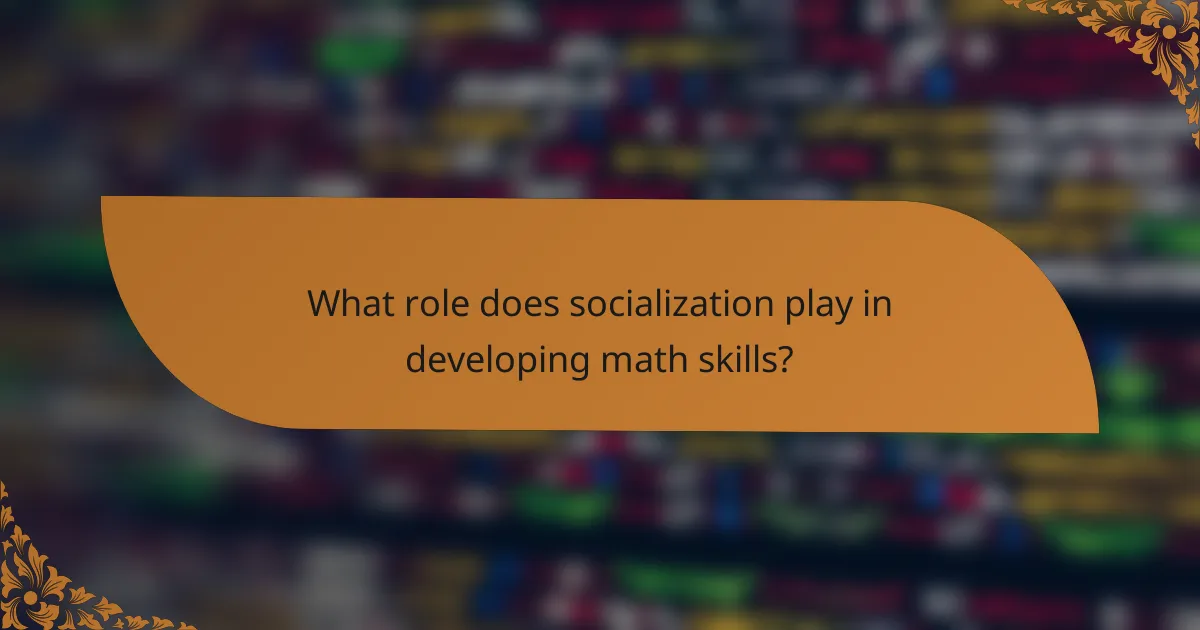
What role does socialization play in developing math skills?
Socialization significantly enhances the development of math skills by fostering collaborative learning environments. Through interaction with peers, students can share different problem-solving approaches, which deepens their understanding of mathematical concepts.
Encourages peer learning
Peer learning occurs when students work together to solve mathematical problems, allowing them to explain concepts to one another. This collaborative approach can lead to a better grasp of material, as students often relate better to explanations from their peers than from instructors. For instance, a student struggling with fractions may benefit from a classmate’s simpler explanation or visual representation.
Encouraging group discussions about math problems can also stimulate critical thinking. Students are more likely to ask questions and explore various methods when they feel comfortable in a social setting.
Facilitates group activities
Group activities in math, such as collaborative projects or math games, create opportunities for students to engage actively with the material. These activities can range from solving puzzles together to competing in math challenges, which make learning enjoyable and interactive. For example, using manipulatives in a group setting can help students visualize problems and develop a stronger conceptual understanding.
Moreover, group activities can cater to different learning styles, ensuring that visual, auditory, and kinesthetic learners all find ways to connect with the content. This inclusivity can enhance overall math skill development.
Supports concept reinforcement
Socialization reinforces math concepts by allowing students to revisit and discuss what they have learned. When students explain mathematical ideas to their peers, they solidify their own understanding and identify any gaps in their knowledge. This process can be particularly effective in study groups where students review material together before tests.
Additionally, regular interaction with peers can help maintain engagement with math topics. For instance, forming study circles can encourage consistent practice and application of math skills, leading to improved retention and performance over time.
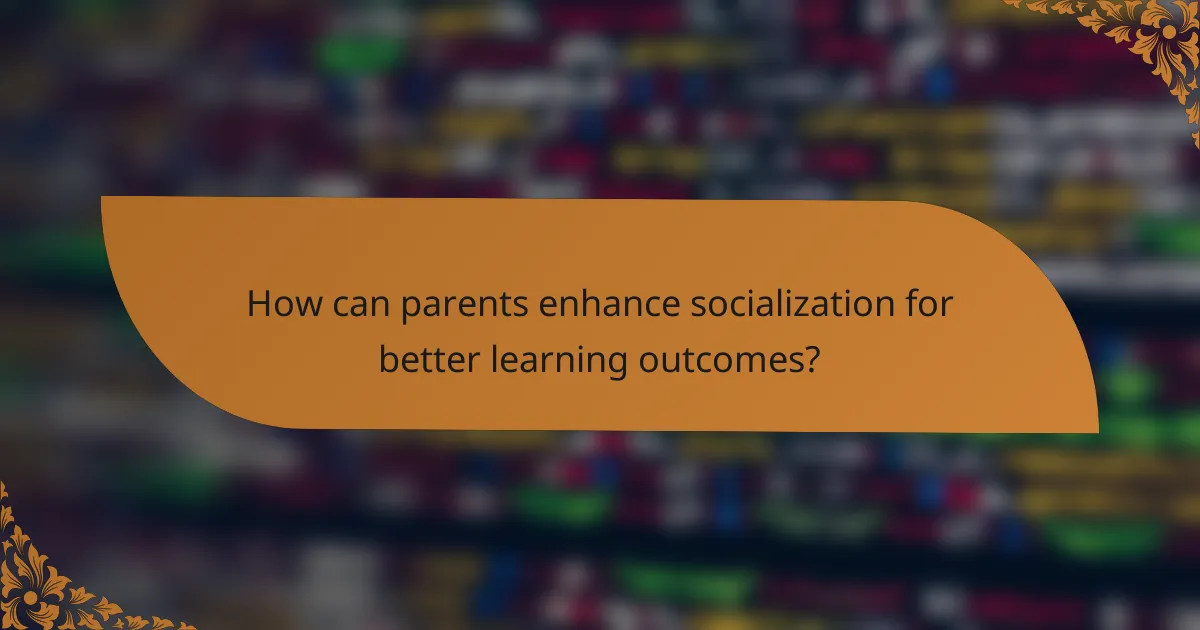
How can parents enhance socialization for better learning outcomes?
Parents can significantly enhance socialization by actively facilitating interactions that promote learning. Engaging children in social activities helps develop essential skills like communication, teamwork, and problem-solving, which are crucial for academic success.
Organizing playdates
Playdates provide children with opportunities to interact and build friendships, which can enhance their social skills. Parents should aim to organize regular playdates, ideally with peers who share similar interests, to foster a comfortable environment for interaction.
When planning playdates, consider varying the settings—such as parks, homes, or community centers—to expose children to different social dynamics. Keep the group small, ideally two to four children, to ensure everyone can participate actively.
Encouraging group activities
Group activities, such as team sports or arts and crafts, encourage collaboration and communication among children. These activities can help children learn to work together towards a common goal, which is essential for developing social skills.
Parents can look for local clubs or classes that focus on group participation, ensuring that children have a chance to engage with others regularly. It’s beneficial to choose activities that align with a child’s interests to maintain their enthusiasm and commitment.
Participating in community events
Community events, such as fairs, festivals, or volunteer opportunities, provide children with a broader social context to interact with peers and adults. These events can enhance a child’s understanding of their community and promote social responsibility.
Parents should seek out local events that are family-friendly and encourage participation. Engaging in community service can also teach children valuable lessons about empathy and teamwork while allowing them to meet new friends.
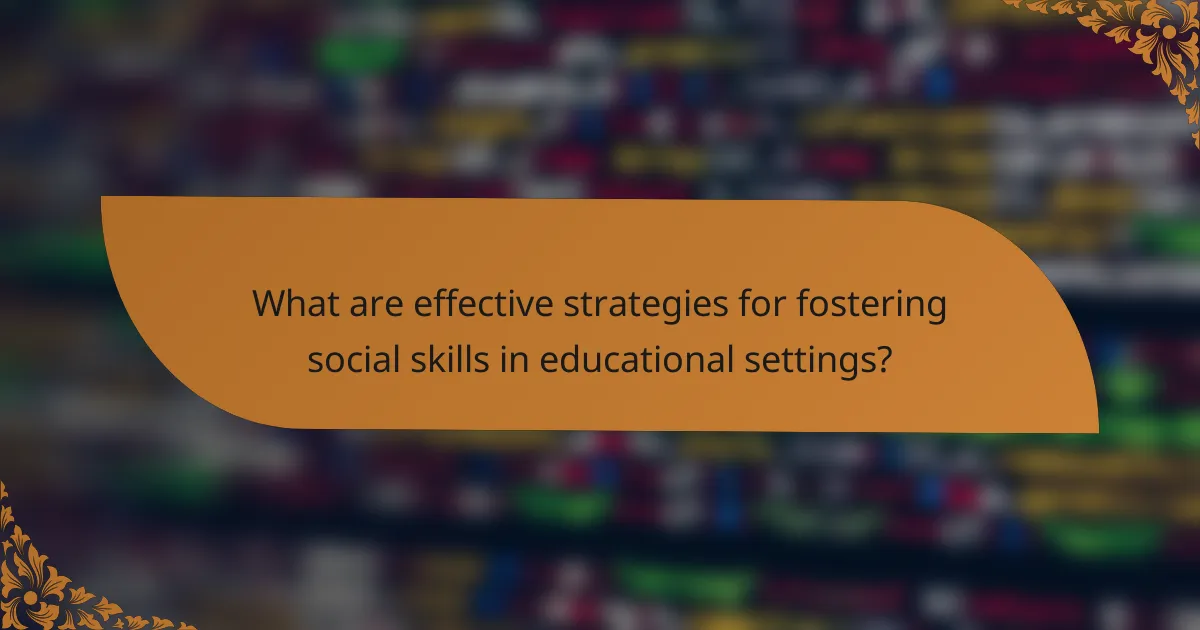
What are effective strategies for fostering social skills in educational settings?
Effective strategies for fostering social skills in educational settings include implementing cooperative learning, utilizing role-playing exercises, and encouraging classroom discussions. These approaches create opportunities for students to interact, collaborate, and develop essential interpersonal skills.
Implementing cooperative learning
Cooperative learning involves students working together in small groups to achieve common goals. This strategy promotes teamwork and communication, allowing students to learn from each other while developing social skills. For example, assigning group projects where each member has a specific role can enhance collaboration and accountability.
To implement cooperative learning effectively, consider using diverse groups to encourage different perspectives. Monitor group dynamics to ensure all students participate and contribute. Avoid grouping students solely by ability; mixed-ability groups often yield better social interactions and learning outcomes.
Utilizing role-playing exercises
Role-playing exercises allow students to practice social scenarios in a safe environment. By acting out different roles, students can explore various perspectives and develop empathy. For instance, simulating a conflict resolution scenario can help students learn negotiation and communication skills.
When incorporating role-playing, provide clear guidelines and objectives to ensure students understand the purpose. Debrief after the activity to discuss what worked well and what could be improved, reinforcing the lessons learned through the exercise.
Encouraging classroom discussions
Classroom discussions foster an open environment where students can express their thoughts and opinions. This practice encourages active listening and respectful dialogue, essential components of effective communication. To facilitate discussions, pose open-ended questions that stimulate critical thinking and invite diverse viewpoints.
To maximize participation, establish ground rules for respectful communication and ensure that all voices are heard. Consider using techniques like “think-pair-share,” where students first think about a question individually, then discuss it with a partner before sharing with the larger group. This approach can help quieter students feel more comfortable contributing.
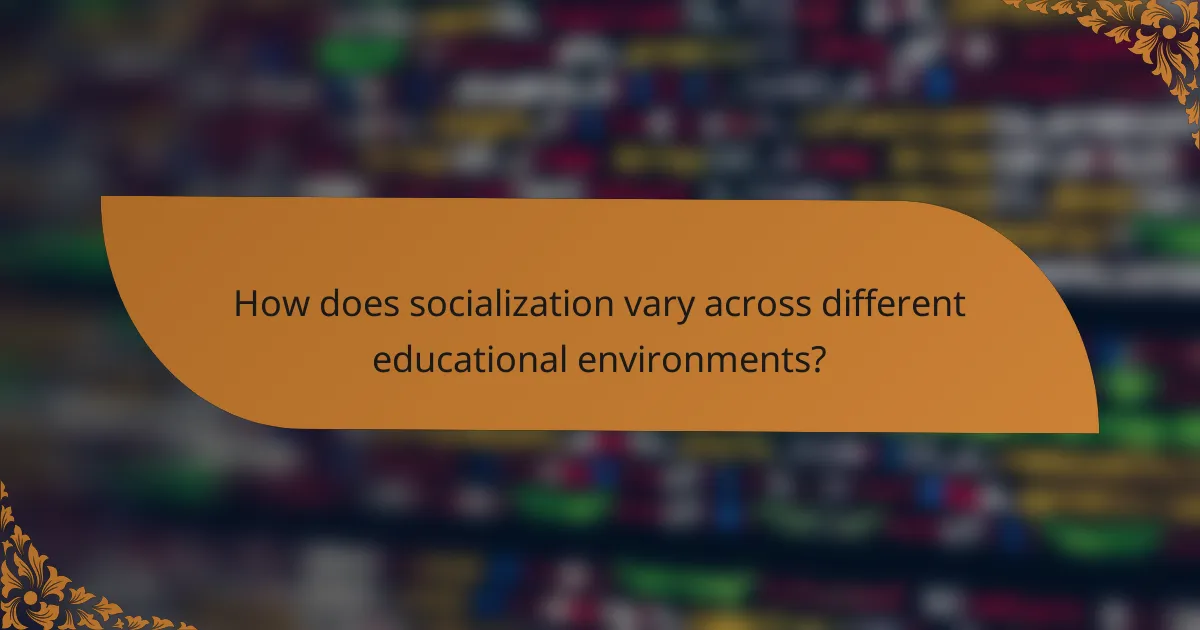
How does socialization vary across different educational environments?
Socialization in educational environments can differ significantly based on the type of institution. Public schools often provide diverse social interactions, while private schools may offer more structured social settings. Homeschooling and online learning present unique challenges and opportunities for social development.
Public schools vs. private schools
Public schools typically offer a broader range of socialization opportunities due to their larger, more diverse student populations. Students interact with peers from various backgrounds, which can enhance social skills and cultural understanding. In contrast, private schools often have smaller class sizes and may foster closer relationships but can lack the same level of diversity.
Parents should consider the social dynamics of each option. Public schools may expose children to a wider array of social situations, while private schools might provide a more controlled environment that aligns with specific values or educational philosophies.
Homeschooling socialization methods
Homeschooling requires intentional strategies for socialization, as children may have fewer daily interactions with peers. Families often engage in co-ops, extracurricular activities, and community events to ensure their children develop social skills. These methods can vary widely, depending on the family’s approach and local resources.
Parents should actively seek opportunities for their children to interact with others. Joining local clubs, sports teams, or community service projects can help homeschoolers build friendships and social networks.
Impact of online learning
Online learning environments can limit face-to-face interactions, which may affect socialization. However, many platforms incorporate discussion forums, group projects, and virtual meetups that can facilitate social connections. The effectiveness of these interactions often depends on how actively students engage with their peers.
To enhance socialization in online learning, students should be encouraged to participate in virtual study groups or collaborative projects. Parents can also support their children by arranging in-person meetups with classmates when possible, fostering a balance between online and offline social experiences.
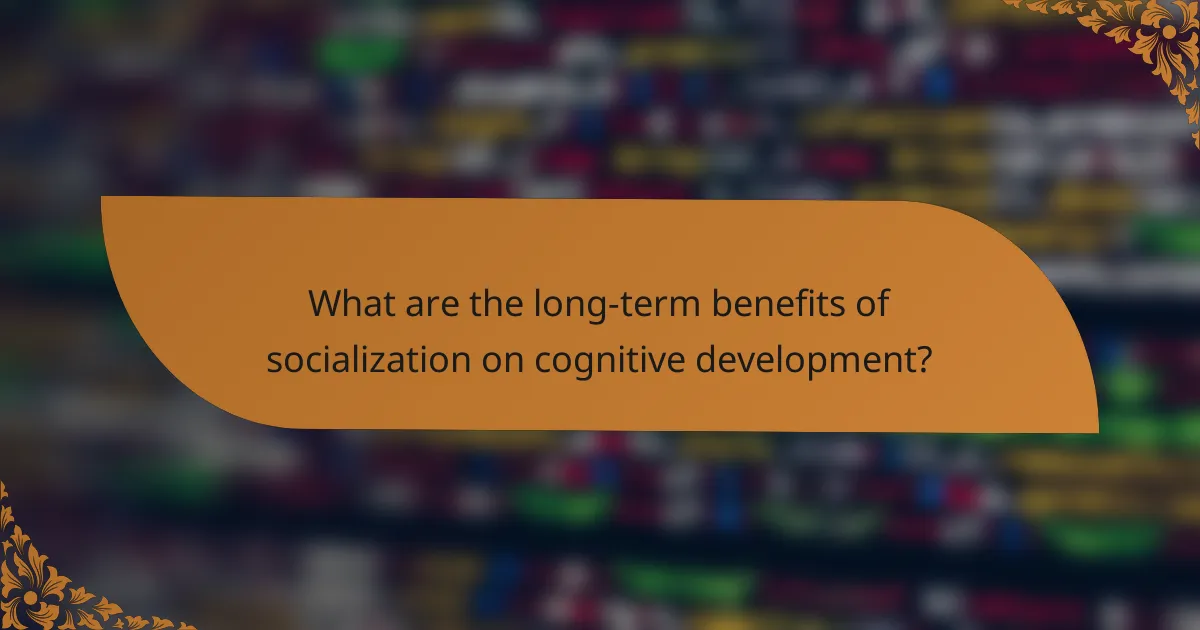
What are the long-term benefits of socialization on cognitive development?
Socialization significantly enhances cognitive development by fostering essential skills such as critical thinking and adaptability. Engaging with peers and adults allows individuals to process information more effectively and navigate complex social environments.
Improved critical thinking
Socialization encourages individuals to engage in discussions and debates, which sharpens their critical thinking abilities. By exchanging ideas and perspectives, they learn to analyze situations, evaluate evidence, and make informed decisions.
For example, children who participate in group activities or collaborative learning environments often demonstrate better problem-solving skills. They learn to question assumptions and consider alternative viewpoints, which are crucial components of critical thinking.
Enhanced adaptability
Through social interactions, individuals develop a greater ability to adapt to new situations and challenges. This adaptability stems from exposure to diverse perspectives and experiences, which helps them navigate change more effectively.
In practical terms, adaptable individuals are better equipped to handle unexpected scenarios, whether in academic settings or the workplace. For instance, students who engage in team projects learn to adjust their strategies based on group dynamics, enhancing their overall flexibility.
